Selenium is a trace mineral that your body needs for protecting DNA and ensuring healthy brain function.
Scientific evidence indicates that selenium may be protective against cognitive decline, oxidative stress, and thyroid dysfunction.
If you need to boost your intake of this obscure but important nutrient, read on—our research team has ranked the ten best selenium supplements on the market.
Research
Rankings
1. Thorne Research Selenomethionine
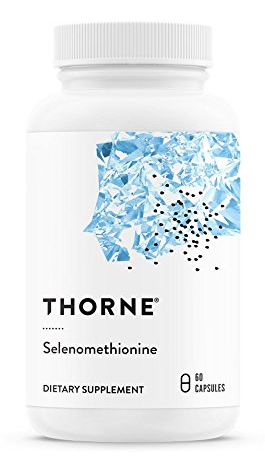
Thorne Research Selenomethionine is the purest selenium supplement on the market when it comes to ingredients.
Aside from selenium itself, the only ingredient is the cellulose that’s used to make up the capsule. For a 200 mcg selenium supplement that makes no compromises on clean supplement design, choose Thorne Research.
2. Pure Encapsulations Selenium
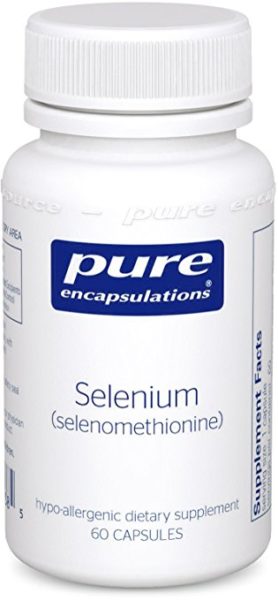
Pure Encapsulations Selenium delivers the standard 200 mcg dose in a cellulose capsule, and aside from a touch of vitamin C for better shelf life, it’s devoid of additional additives, making it a smart choice.
3. Dr. Mercola Zinc + Selenium
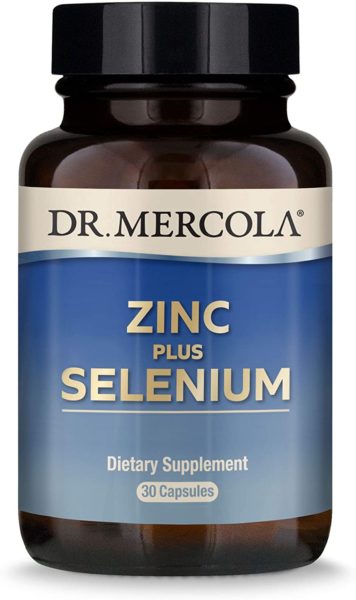
Dr. Mercola Zinc + Selenium has a targeted formula to address some of the most common trace mineral deficiencies in elderly people.
In addition to its namesake ingredients of zinc (15 mg) and selenium (200 mcg), this supplement also includes 0.25 mg of copper, another essential trace mineral that’s increasingly important as you get older.
Though it’s not the product for you if all you want to address is your selenium levels, many users will appreciate its more holistic approach to mineral deficiencies.
4. Life Extension Super Selenium Complex
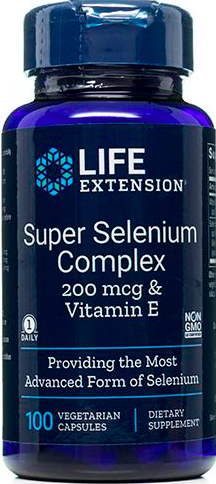
Life Extension Super Selenium Complex pairs two forms of selenium with vitamin E for added antioxidant power. This supplement is designed specifically to take advantage of selenium’s benefit for long-term well-being and youthfulness, and the inclusion of two different types of selenium might marginally improve the bioavailability of this supplement.
While the supplement design isn’t the cleanest, it’s still a solid pick for those interested in combining selenium with other powerful antioxidants like vitamin E.
5. NOW Foods Selenium
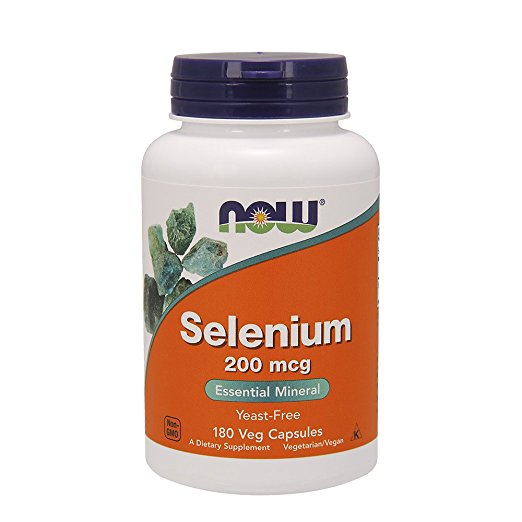
NOW Foods has, as expected for this brand, a simple and no-nonsense selenium supplement. It delivers 200 mcg of selenium per capsule, and the capsules are made of cellulose.
Aside from a bit of rice flour and stearic acid to hold the capsule together, there are no additional ingredients, making it a solid pick for those conscious about purity.
6. Zhou Nutrition Selenium
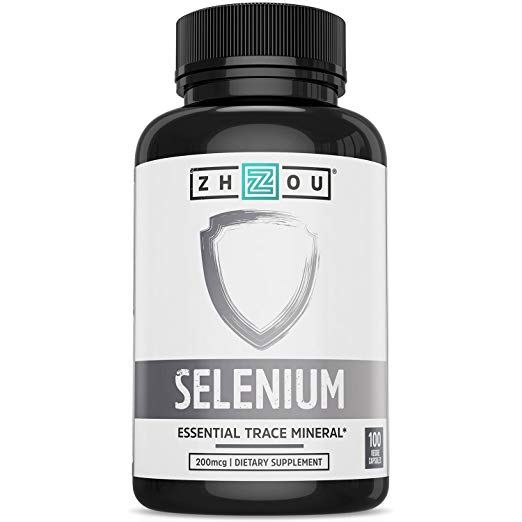
Zhou Nutrition is usually pretty innovative with their supplements, but everything about this selenium supplement is standard fare.
The dosage is the typical 200 mcg, and unfortunately, it has few extra additives like silica and magnesium stearate that you won’t find in other competitors.
7. Go Nutrients Selenium
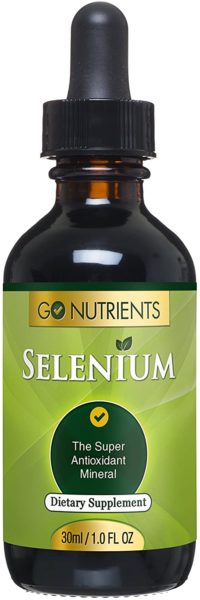
Go Nutrients Selenium has a very particular niche use, which is for people who can’t or don’t like to take pill-based supplements.
This liquid form selenium supplement contains 200 mcg selenium in each six droplet serving, but measuring out drops with precision is difficult, so you’re not likely to get a reliable dosage.
Most people would be better suited for a different selenium supplement, but if you really want to avoid capsules and pills, or really want to be able to mix selenium into shakes, juices, or smoothies, it’s well-suited for your needs.
8. NutriONN Selenium
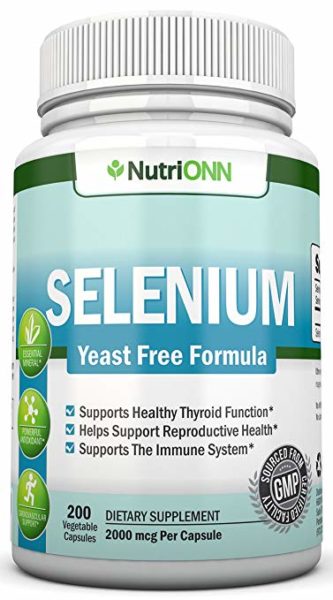
NutriONN Selenium has the typical 200 mcg dose of selenium, but its supplement design isn’t the cleanest. WIth additives like silicon dioxide and no real features to make it stand out from the crowd, it’s hard to rate this supplement much higher.
9. BRI Nutrition Selenium Extra Strength
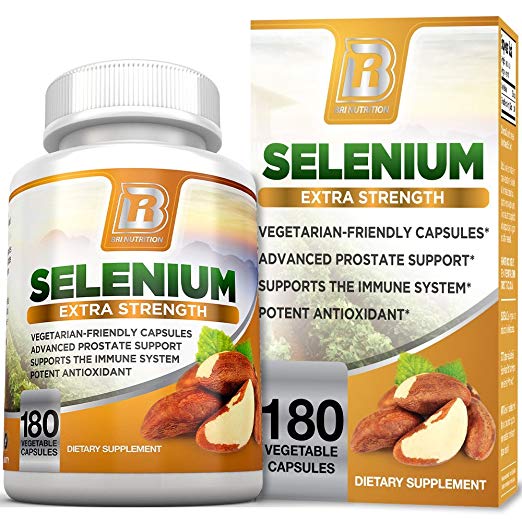
BRI Nutrition Selenium Extra Strength bills itself as an extra strength supplement, but in reality, its dosage of selenium is no higher than the competition.
With fairly mediocre purity as far as ingredients, it doesn’t do much to stand apart from other products on the market.
10. Nature’s Bounty Selenium
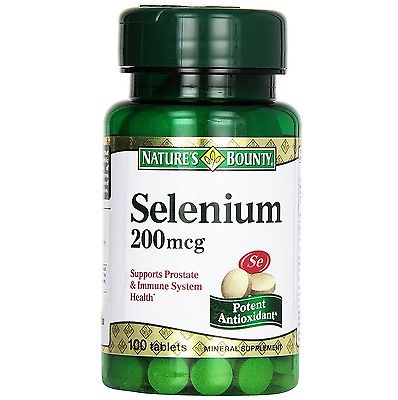
Nature’s Bounty Selenium includes the usual 200 mcg of selenium. Its selenium is produced biologically, by specially-engineered yeast.
The presence of high levels of brewer’s yeast might cause some problems if you are trying to alter your body’s probiotic makeup, for example, you might not want to be adding yeast in the form of a supplement, even as a byproduct.
Category winners
Best selenium overall: Thorne Research Selenomethionine
Thorne Research makes a selenium supplement that’s super-pure and comes in an amino acid-chelated form that gives it superior bioavailability, making it our top pick for an all-purpose selenium supplement.
Best selenium for thyroid health: Dr. Mercola Zinc + Selenium
Selenium is essential for thyroid function, but may work even better when paired with zinc (which, as you might expect, also plays a critical role in regulating thyroid hormones). Dr. Mercola Zinc + Selenium is the best on the market when it comes to zinc/selenium supplements, so it’s our recommendation for thyroid health.
Best selenium for cognitive function: Thorne Research Selenomethionine
The purity, high dose, and highly bioavailable source of selenium in Thorne Research Selenomethionine make it simply the best option if you’re looking for selenium to sustain brain health and cognitive function over the long-term.
Best selenium with zinc: Dr. Mercola Zinc + Selenium
Dr. Mercola is great whether you are taking selenium for thyroid function or sexual wellness—by pairing selenium with zinc, another critical trace mineral, you get additional hormonal benefits compared to just taking selenium alone.
Best selenium for women: Thorne Research Selenomethionine
Women looking for a reliable source of supplemental selenium should opt for Thorne Research Selenomethionine—it’s devoid of extraneous ingredients and has a highly effective dosage as well.
Best selenium for aging: Life Extension Super Selenium Complex
Life Extension’s two -part, amino acid chelated selenium complex is great for aging thanks to the complementary bioavailability benefits offered by providing two forms of this trace mineral instead of just one. The dosage is solid, and the supplement design is very clean, too.
Who should buy selenium?
Selenium supplements are especially beneficial for individuals who have tested low in selenium, or is from a country whose soil is depleted in selenium. It also great for men who are looking to optimize their testosterone and sperm production.
Selenium may also benefit older people as it helps reduce chronic inflammation, which can play a role in preventing neurodegenerative diseases. Special populations should speak to a doctor before starting a supplement regimen containing selenium, as it may not be appropriate for them.
How we ranked
There are four main types of selenium supplements to consider: Selenium sulfide, Sodium selenite, selenium-enriched yeast, and selenomethionine. Of the four options, the last two are preferred because they are organically derived. Inorganic forms of selenium are easily removed by the kidneys and do not provide adequate benefits. Organic forms that are protein-bound are better absorbed and used in the body, making them the optimal choice. As such, the top products on our list, like Thorne Research Selenium, came from organic sources.
We also looked at other included ingredients. Products that were free of additives and fillers, like Pure Encapsulations, were rewarded. Other supplements, like Dr. Mercola, that included complementary ingredients such as zinc, ranked higher for providing a more well-rounded supplement.
Dosage was also important to consider. According to many studies, the average adult needs around 50-60mcg of selenium per day. However, since many people who take selenium supplements are deficient, more is needed. As such, products that contained the standard 200 mcg dose, like Now Foods and Zhou, we rewarded. This helped support deficient individuals, while also not going too high, potentially causing an overdose.
Benefits
Selenium helps protect your body’s cells and DNA from oxidative damage. Selenium plays a very specific antioxidant role inside your body, according to a review article published in 2000 in The Lancet by Margaret Rayman at the University of Surrey (1).
The review cites dozens of studies that describe the molecular mechanisms behind selenium’s ability to protect cells in your body from oxidation.
Oxidative damage (as well as the inflammation that goes along with it) are implicated in just about every chronic disease you can think of, from heart disease to cancer to cognitive impairment in the elderly.
Selenium acts at the level of the cell membrane, protecting external free radicals from causing damage to the membrane around the cell.
Selenium may protect sperm cells against oxidative damage. One specific type of cell that seems to benefit from selenium is sperm cells in men.
A study published in 2003 in the journal Mutation Research/Genetic Toxicology and Environmental Mutagenesis found an interesting connection between selenium levels in the blood and sperm health and quality in healthy men (2).
The researchers showed that higher selenium levels in the blood were linked to less oxidative damage in sperm, and better quality and density of sperm.
This suggests that selenium might play a role in male reproductive health thanks to its antioxidant properties, and indeed, you’ll find it in a few male enhancement supplements for exactly this reason.
Low selenium levels are associated with worse cognitive function in the elderly. Selenium appears to play a role in brain function as well as in oxidative damage protection, as evidenced by several studies connecting selenium deficiency to poor cognitive performance, particularly in older people.
One such study published in 2007 in the American Journal of Epidemiology looked at levels of selenium in nail clippings (an easy to measure proxy for long-term selenium exposure) among a group of elderly people living in rural China (3). The subjects then took a battery of cognitive function tests that examined memory and learning.
When the researchers compared cognitive performance as a function of selenium levels, they found a consistent positive association between selenium levels and memory and learning performance across all but one test, providing strong evidence that high levels of selenium during your older years could protect your brain from cognitive decline.
Selenium might directly prevent degenerative diseases of the brain like Alzheimer’s. Additional evidence, both from animal studies and from humans, suggests that selenium helps protect your brain.
A study in rats published in 2009 in the journal Brain Research by scientists at Hamdard University in India provided evidence at the molecular level for the protective effects of selenium against Alzheimer’s disease (4).
Their experiment that selenium was able to significantly reduce the effects of an artificially-induced version of Alzheimer’s in male rats, and more critically, they showed that this reduction was linked to the antioxidant activity of selenium, providing a biological link between its antioxidant and its neuroprotective effects.
In humans, research published by a team of scientists from France in the journal Epidemiology showed a long-term link between selenium levels in the blood and cognitive decline (5).
They showed that long-term declines in blood levels of selenium, measured over the course of nine years, were associated with an increased risk of developing cognitive decline.
More specifically, the risk was proportional to selenium levels: the greater the decline with age, the greater the likelihood of developing cognitive decline.
Reducing chronic inflammation is likely the reason selenium appears to improve brain health. More evidence for the connection between chronic inflammation and cognitive decline came from a four year long study published in the Journal of the American Geriatrics Society (6).
The researchers followed over 1,100 healthy adults age 60 to 70 and tracked both their cognitive function and their overall level of inflammation, as assessed by a biomarker called thiobarbituric acid reactive substances or TBARS. The researchers found that the level of TBARS during the study was predictive of a subject’s risk for decreases in cognitive function compared to baseline.
Moreover, the researchers found that selenium levels were inversely associated with risk of cognitive decline: the greater a person’s selenium levels, the lesser their risk of cognitive decline.
These findings from various studies in different populations together make a robust case for the importance of selenium when it comes to preserving brain function as you get older.
Selenium plays a role in proper functioning of the thyroid gland. Initial research into the function of selenium noted that it had a particularly high concentration in the thyroid gland, suggesting that it played an important role in ensuring the proper regulation of the production of thyroid hormones.
Later work, such as an article published in the journal endocrine review by three researchers at Humboldt University in Germany, confirmed these suspicions (7).
Selenium is used in the thyroid to prevent oxidation from hydrogen peroxide, which could disrupt the synthesis of critical proteins for hormone production.
In the thyroid, selenium seems to work in conjunction with iodine, another mineral that is critical for thyroid function. You’ll find both in many thyroid supplements.
Most research to date has focused on the effects of selenium supplementation on the thyroid problems associated with acute iodine and selenium dysfunction, so it’s unclear exactly what role selenium could play in chronic hypothyroid or hyperthyroid conditions. Selenium by itself, though, does appear to increase risk for thyroid problems if taken in excess.
Side effects
According to the Office of Dietary Supplements at the United States National Institutes of Health, excessive selenium intake can cause brittle nails, hair loss, a garlic-like smell in your breath, fatigue, and rashes (8).
High intakes of selenium have been studied in great detail because of the unusually high level of selenium in Brazil nuts (two Brazil nuts can contain as much selenium as a typical over the counter selenium supplement).
As a result of these studies, the Office of Dietary Supplements has set tolerable upper limits of selenium at 400 mcg per day for adult males and female.
Some research has also suggested, at least in theory, that high levels of selenium could impair ovarian function in women, though hard epidemiological evidence for this effect is not evident yet (9).
Some epidemiological studies have also found an increased risk for type 2 diabetes in people with higher selenium levels than average (10), and selenium by itself can dominate the function of iodine in the thyroid gland, leading to thyroid problems (11). These seem to appear at intakes greater than 300 mcg per day.
Recommended dosage
Given the upper limits discussed above, it should be no surprise that the vast majority of over the counter selenium supplements have 200 mcg of selenium each.
Taking one of these capsules per day should be enough to boost your selenium without putting you over the daily limit, unless you consume a lot of foods rich in selenium. This is also in line with the dosage level used in many clinical studies.
FAQ
What are the best selenium-rich foods? Brazil nuts are by far the best source of selenium, containing around 544 mcg per ounce. Other selenium-rich foods include fish, ham, beef, and turkey.
Does selenium reduce the risk of certain cancer? Selenium may reduce the risk of certain cancers by helping to protect against oxidative damage. According to a meta-analysis, which looked at 69 studies, high blood levels of selenium were correlated with a lowered risk of prostate, lung, and breast cancer (12).
Can selenium boost the immune system? Yes, selenium can help boost the immune system response time, as well as identify foreign substances in the body that need to be killed. Low selenium levels have also been correlated with slower immune response times, which can make you more susceptible to various bacteria and diseases.
How does selenium help with asthma? Asthma occurs as a result of inflammation of the airways, which causes wheezing and coughing. Since selenium is a powerful anti-inflammatory agent, it is suggested that it can help reduce the symptoms and severity of asthma in people. However, more research is needed to confirm this.
Are oysters rich in selenium? Yes, oysters are rich in selenium. Per 3 ounces or 85g, they contain up to 238% of your daily value. They are still lower than brazil nuts which contain around 174% of your daily value per nut.
What is selenium? Selenium is one of the most critical micronutrients that the human body needs to remain healthy. It helps with DNA production, thyroid gland function, and reproduction. It’s also an antioxidant, so it protects your body from free radical molecular damage and certain types of infection.
Selenium can exist in either an inorganic or organic form, both of which can provide dietary benefits. Most selenium is found in animal and human tissues, allowing it to incorporate with amino acids and specific body proteins to assist with various functions. A lot of the body’s selenium is also stored in skeletal muscle.
How much selenium is too much? Adults should not consume more than 400 mcg of selenium per day, with children usually needing less than 300 mcg.
Is selenium an antioxidant? An antioxidant like selenium is a substance that stops cellular damage caused by free radicals. Free radicals are unstable molecules that are produced when the body reacts to environmental pressures or infections. Other examples of antioxidants include Vitamin C, manganese, and Vitamin E.
Does fruit contain a lot of selenium? Unfortunately, fruit only contains traces amount of selenium. It it best to mix it with other selenium rich foods such as chopped brazil nuts and yogurt.
How much selenium do I need? Starting from around age 14-18, teenagers and adults need about 55 mcg of selenium until death. Pregnant teenagers or adult women need 60 mcg of selenium while breastfeeding teenage or adult women need 70 mcg of selenium. This is because of increased nutritional demands from either the fetus or breastfeeding baby (13).
How do scientists test for selenium levels? Scientists can measure the amount of selenium in your body via your blood, plasma, serum, or urine.
Where can you get selenium in foods? Selenium can be found naturally in all kinds of foods and is heavily influenced by the contents of the soil where the plant was grown. Similarly, the selenium in an animal product depends on how much selenium-rich food the animal ate before death.
Selenium can be found in most types of meat, eggs, poultry, seafood, and dairy products. Certain types of bread and other grain products may also naturally contain some selenium. Nuts, especially walnuts and Brazil nuts, are known to provide very high amounts of selenium compared to other foods.
Is selenium found in multivitamins? Yes, selenium can also be found in most multivitamin-mineral supplements since it’s a crucial micronutrient needed for human health. A “one-a-day” or similar vitamin should have enough of this micronutrient for your needs.
Which types of people are susceptible to low selenium levels? Those who don’t have balanced diets may not get enough selenium for their daily requirements, particularly if the soil in their environment does not have much selenium. Other selenium-deficient groups include people undergoing kidney dialysis for any reason and those living with HIV.
Why are kidney dialysis patients susceptible to low selenium levels? Kidney dialysis often removes a lot of selenium from the body during treatment, which is what leads to low selenium levels.
Where are selenium concentrations naturally low? Low selenium diets come from specific regions in Russia and mainland China, where the soil has naturally low concentrations of this mineral. If you live elsewhere, the chances are small that your environment doesn’t have enough selenium.
If soil is low in selenium, how do animals get the mineral? Many grains and livestock feeds are fortified with selenium to make up for any deficits.
Does selenium help your DNA? Selenium is a little-known trace mineral that helps your brain stay healthy, helps your DNA and cells avoid oxidative damage, and helps your thyroid function properly.
Though acute deficiencies in selenium are rare, emerging evidence suggests that higher selenium levels might be associated with better long-term health and cognitive function.
What happens if I don’t consume enough selenium? While selenium deficiency is rare, it can also cause male infertility and Keshan disease, which affects the heart. Keshan disease is characterized by heart failure and pulmonary edema.
However, this disease is usually only contracted outside of the U.S. and Canada, as both countries’ soils have enough selenium for most people.
Another potential side effect of low sodium is Kashin-Beck disease. This is a variation of arthritis that can cause loss of motion, along with swelling and pain, in your joints. In all of these cases, bringing your selenium intake levels back to normal can help to alleviate symptoms or get rid of the disease.
There is some evidence that those who consume lower than average amounts of selenium at increased risk of developing certain cancer types, particularly of the colon and rectum, lung, bladder, skin, stomach, esophagus, and prostate. Selenium may also help reduce the risk of cardiovascular disease, which is one of the most common killers in America and Canada.
Additionally, the blood level of selenium in a person naturally decreases with age. This may correlate with lower mental function and certain mental illnesses, though the connection is not clear.
Does selenium help thyroid production? It is known that the thyroid gland requires high amounts of selenium to operate correctly. The thyroid gland is an integral part of your brain that regulates the metabolic rate across your entire body, along with helping to regulate your digestive and heart function, mood, and bone maintenance. Having issues with your thyroid are likely to lead to several related health effects or illnesses. However, the thyroid typically develops problems because of a lack of iodine (more than a lack of selenium).
Can you consume too much selenium? Yes, you can consume too much selenium. Consuming more than the recommended daily amount of selenium can eventually add up to serious side effects, including nausea, irritability, teeth discoloration, brittle nails, diarrhea, garlic breath, skin rashes, and a metallic taste in the mouth. In severe cases, kidney failure, heart attacks, and heart failure, and even tremors may occur.
Can selenium interfere with other medications? Yes, selenium can interfere with other medications. You should always speak to your doctor before taking a selenium supplement or vitamin containing selenium, especially if you already have a selenium-rich diet.
Some drugs can lower your selenium levels and require that you took a selenium supplement when you didn’t need to before. Certain chemotherapy drugs like cisplatin have the side effect of lowering your selenium levels in your blood.
Why do people take selenium supplements? Many people take selenium supplements to round out their diets if they aren’t getting enough of the micronutrient from their natural foods. But selenium has also attracted attention because it’s an antioxidant. Its protective properties have caused many to link selenium with better skin health and overall organ function.
However, it’s no more functional or effective at preventing your skin from aging or keeping your organs safe than any other antioxidants like vitamin C, which can be obtained from citrus fruits and many other sources.
Some have suggested that higher selenium intake can help you treat asthma and other diseases like rheumatoid arthritis and cardiovascular disease. However, more research is necessary.
Can selenium help with memory loss or cognitive decline? The mind loses some selenium as it ages, so taking selenium supplements may slow the onset of certain cognitive deficiencies and mental illnesses. However, there is no concrete evidence that selenium can stop cognitive decline.
What is the best way to take a selenium supplement? If your doctor prescribes a supplement rather than only eating more selenium-rich foods, your selenium supplement will be packaged alongside sodium in tablet form.
The two most common types of selenium supplements are sodium selenite and sodium selenate. These tablets can be taken like any other pill or oral supplement and swallowed with water, preferably with or immediately after a meal.
Related Articles
Recap
Selenium is an important trace mineral that’s associated with increased resistance to oxidative damage, improvements in brain and thyroid health (in moderate amounts), and protection against cognitive decline in the elderly.
Selenium levels drop over time as you get older, so increasing your selenium intake appears to be a priority particularly for people who are age 60 and older.
There are some risks associated with chronically high selenium intake, so supplementation is only the right choice if you know your dietary intake is low.
Typical clinical trials use doses of 200 mcg per day, taken in one single dose, and this is in line with what’s available in a supplement bought over the counter.
When used by the right people in the right circumstances, selenium could help boost your resistance to oxidative damage, chronic inflammation, and losses in cognitive function.
For BodyNutrition’s #1 recommended selenium supplement, click here.